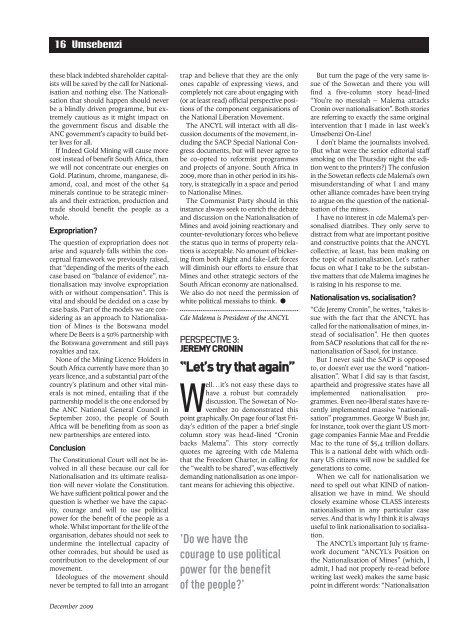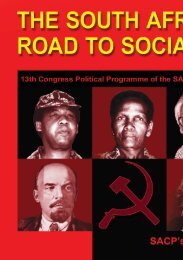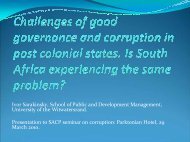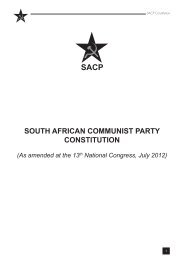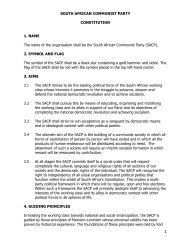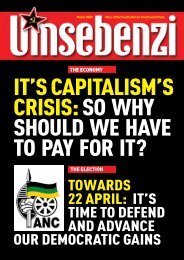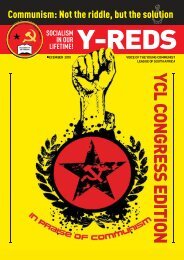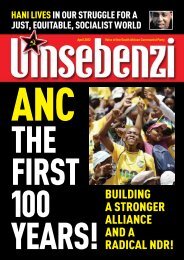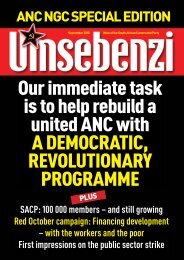Forward to Socialism!! - South African Communist Party
Forward to Socialism!! - South African Communist Party
Forward to Socialism!! - South African Communist Party
Create successful ePaper yourself
Turn your PDF publications into a flip-book with our unique Google optimized e-Paper software.
16 Umsebenzi<br />
these black indebted shareholder capitalists<br />
will be saved by the call for Nationalisation<br />
and nothing else. The Nationalisation<br />
that should happen should never<br />
be a blindly driven programme, but extremely<br />
cautious as it might impact on<br />
the government fiscus and disable the<br />
ANC government’s capacity <strong>to</strong> build better<br />
lives for all.<br />
If Indeed Gold Mining will cause more<br />
cost instead of benefit <strong>South</strong> Africa, then<br />
we will not concentrate our energies on<br />
Gold. Platinum, chrome, manganese, diamond,<br />
coal, and most of the other 54<br />
minerals continue <strong>to</strong> be strategic minerals<br />
and their extraction, production and<br />
trade should benefit the people as a<br />
whole.<br />
Expropriation?<br />
The question of expropriation does not<br />
arise and squarely falls within the conceptual<br />
framework we previously raised,<br />
that “depending of the merits of the each<br />
case based on “balance of evidence”, nationalisation<br />
may involve expropriation<br />
with or without compensation”. This is<br />
vital and should be decided on a case by<br />
case basis. Part of the models we are considering<br />
as an approach <strong>to</strong> Nationalisation<br />
of Mines is the Botswana model<br />
where De Beers is a 50% partnership with<br />
the Botswana government and still pays<br />
royalties and tax.<br />
None of the Mining Licence Holders in<br />
<strong>South</strong> Africa currently have more than 30<br />
years licence, and a substantial part of the<br />
country’s platinum and other vital minerals<br />
is not mined, entailing that if the<br />
partnership model is the one endorsed by<br />
the ANC National General Council in<br />
September 2010, the people of <strong>South</strong><br />
Africa will be benefiting from as soon as<br />
new partnerships are entered in<strong>to</strong>.<br />
Conclusion<br />
The Constitutional Court will not be involved<br />
in all these because our call for<br />
Nationalisation and its ultimate realisation<br />
will never violate the Constitution.<br />
We have sufficient political power and the<br />
question is whether we have the capacity,<br />
courage and will <strong>to</strong> use political<br />
power for the benefit of the people as a<br />
whole. Whilst important for the life of the<br />
organisation, debates should not seek <strong>to</strong><br />
undermine the intellectual capacity of<br />
other comrades, but should be used as<br />
contribution <strong>to</strong> the development of our<br />
movement.<br />
Ideologues of the movement should<br />
never be tempted <strong>to</strong> fall in<strong>to</strong> an arrogant<br />
trap and believe that they are the only<br />
ones capable of expressing views, and<br />
completely not care about engaging with<br />
(or at least read) official perspective positions<br />
of the component organisations of<br />
the National Liberation Movement.<br />
The ANCYL will interact with all discussion<br />
documents of the movement, including<br />
the SACP Special National Congress<br />
documents, but will never agree <strong>to</strong><br />
be co-opted <strong>to</strong> reformist programmes<br />
and projects of anyone. <strong>South</strong> Africa in<br />
2009, more than in other period in its his<strong>to</strong>ry,<br />
is strategically in a space and period<br />
<strong>to</strong> Nationalise Mines.<br />
The <strong>Communist</strong> <strong>Party</strong> should in this<br />
instance always seek <strong>to</strong> enrich the debate<br />
and discussion on the Nationalisation of<br />
Mines and avoid joining reactionary and<br />
counter-revolutionary forces who believe<br />
the status quo in terms of property relations<br />
is acceptable. No amount of bickering<br />
from both Right and fake-Left forces<br />
will diminish our efforts <strong>to</strong> ensure that<br />
Mines and other strategic sec<strong>to</strong>rs of the<br />
<strong>South</strong> <strong>African</strong> economy are nationalised.<br />
We also do not need the permission of<br />
white political messiahs <strong>to</strong> think.<br />
Cde Malema is President of the ANCYL<br />
PERSPECTIVE 3:<br />
JEREMY CRONIN<br />
“Let’s try that again”<br />
Well…it’s not easy these days <strong>to</strong><br />
have a robust but comradely<br />
discussion. The Sowetan of November<br />
20 demonstrated this<br />
point graphically. On page four of last Friday’s<br />
edition of the paper a brief single<br />
column s<strong>to</strong>ry was head-lined “Cronin<br />
backs Malema”. This s<strong>to</strong>ry correctly<br />
quotes me agreeing with cde Malema<br />
that the Freedom Charter, in calling for<br />
the “wealth <strong>to</strong> be shared”, was effectively<br />
demanding nationalisation as one important<br />
means for achieving this objective.<br />
'Do we have the<br />
courage <strong>to</strong> use political<br />
power for the benefit<br />
of the people?'<br />
But turn the page of the very same issue<br />
of the Sowetan and there you will<br />
find a five-column s<strong>to</strong>ry head-lined<br />
“You’re no messiah – Malema attacks<br />
Cronin over nationalisation”. Both s<strong>to</strong>ries<br />
are referring <strong>to</strong> exactly the same original<br />
intervention that I made in last week’s<br />
Umsebenzi On-Line!<br />
I don’t blame the journalists involved.<br />
(But what were the senior edi<strong>to</strong>rial staff<br />
smoking on the Thursday night the edition<br />
went <strong>to</strong> the printers?) The confusion<br />
in the Sowetan reflects cde Malema’s own<br />
misunderstanding of what I and many<br />
other alliance comrades have been trying<br />
<strong>to</strong> argue on the question of the nationalisation<br />
of the mines.<br />
I have no interest in cde Malema’s personalised<br />
diatribes. They only serve <strong>to</strong><br />
distract from what are important positive<br />
and constructive points that the ANCYL<br />
collective, at least, has been making on<br />
the <strong>to</strong>pic of nationalisation. Let’s rather<br />
focus on what I take <strong>to</strong> be the substantive<br />
matters that cde Malema imagines he<br />
is raising in his response <strong>to</strong> me.<br />
Nationalisation vs. socialisation?<br />
“Cde Jeremy Cronin”, he writes, “takes issue<br />
with the fact that the ANCYL has<br />
called for the nationalisation of mines, instead<br />
of socialisation”. He then quotes<br />
from SACP resolutions that call for the renationalisation<br />
of Sasol, for instance.<br />
But I never said the SACP is opposed<br />
<strong>to</strong>, or doesn’t ever use the word “nationalisation”.<br />
What I did say is that fascist,<br />
apartheid and progressive states have all<br />
implemented nationalisation programmes.<br />
Even neo-liberal states have recently<br />
implemented massive “nationalisation”<br />
programmes. George W Bush jnr,<br />
for instance, <strong>to</strong>ok over the giant US mortgage<br />
companies Fannie Mae and Freddie<br />
Mac <strong>to</strong> the tune of $5,4 trillion dollars.<br />
This is a national debt with which ordinary<br />
US citizens will now be saddled for<br />
generations <strong>to</strong> come.<br />
When we call for nationalisation we<br />
need <strong>to</strong> spell out what KIND of nationalisation<br />
we have in mind. We should<br />
closely examine whose CLASS interests<br />
nationalisation in any particular case<br />
serves. And that is why I think it is always<br />
useful <strong>to</strong> link nationalisation <strong>to</strong> socialisation.<br />
The ANCYL’s important July 15 framework<br />
document “ANCYL’s Position on<br />
the Nationalisation of Mines” (which, I<br />
admit, I had not properly re-read before<br />
writing last week) makes the same basic<br />
point in different words: “Nationalisation<br />
December 2009


